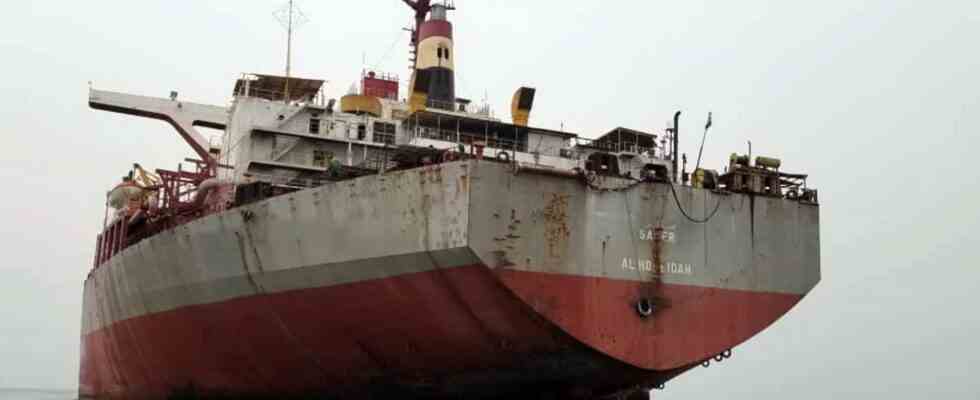Status: 09/09/2022 12:07 p.m
A rusting oil tanker has been bobbing off the coast of Yemen for years. It could explode at any time. The oil needs to be pumped out urgently. According to activists, the fact that nothing happens is also due to Germany.
Every day the likelihood of an oil spill off the coast of Yemen is increasing – if it does, the magnitude would be four times greater than the Exxon Valdez accident in Alaska more than 30 years ago.
The “FSO Safer” is anchored there: built in 1976, 260 meters long. The reddish-rusty mega tanker has been used as a floating storage facility since 1987. He has loaded 180 million liters of crude oil – a highly explosive cargo. The Safer has not been serviced since the beginning of Yemen’s civil war.
Leaks are visible at the bow. Many valves and lines are ailing, machines are defective. Gas can no longer be pumped out of the hull. “The oil could explode at any time,” warns David Gressly, UN coordinator for Yemen. Otherwise just break the ship. All experts agree that the ship is in the last stage before disintegration. And that just before the autumn storms in the Red Sea: “The storms increase from October to December. During this time, the probability that the ship will break up is highest.”
Criticism of Germany for insufficient payments to secure a dilapidated oil tanker off the Yemeni coast
Daniel Hechler, ARD Cairo, daily news at 12:00 p.m., September 8th, 2022
Disastrous consequences for decades
The consequences would be catastrophic for the entire region. Not only fishing grounds in the Red Sea would be destroyed for decades. Two hundred thousand fishermen would no longer have a livelihood. According to UN estimates, cleaning the water would cost 20 billion euros – money that would not be available for humanitarian aid.
The port of Hodeida would also be blocked – Yemen’s lifeline, through which aid supplies, fuel and medicines are delivered to the suffering population of Yemen. Other Red Sea ports in Somalia or Djibouti would also be affected, Gressly believes. In addition, shipping traffic via the Suez Canal would have to be stopped, with devastating economic consequences for the global economy. Greenpeace’s Manfred Santen warns: “We are heading for a catastrophe”. That is why it is so important to act now, before the stormy season begins.
Germany has not yet paid
What needs to be done to avert the catastrophe is well known. The United Nations devised an elaborate plan in March to pump the oil off to another ship and store it safely. The emergency operation would cost about 80 million euros. At a donors’ conference in August, 70 million euros were pledged. Only ten million are missing.
David Gressly puts the pressure on: “You have to deliver now! We can’t get started without the money.” A number of countries have pledged money but have not yet paid anything.
Manfred Santen from Greenpeace adds: “It is unacceptable that these ten million euros, which are still missing, should be the reason that this catastrophe is accepted with open eyes.” Because once it’s too late, he warns, the consequences would cost billions.
Fear of new bad news
Germany has not yet paid its promised contribution of eight million euros, says Greenpeace. “The fact that not all donor nations have paid is astonishing and also outrageous,” says Santen.
And so nothing else happens. Autumn is just around the corner. Concerns are growing that help could come too late. Especially among the people of Yemen.
After seven years of war, 20 million people there are dependent on aid supplies. Many suffer from hunger, especially children. If the “FSO Safer” runs out, all aid deliveries over the sea would have to be stopped. It would be new bad news for people in one of the worst crises in the world.

